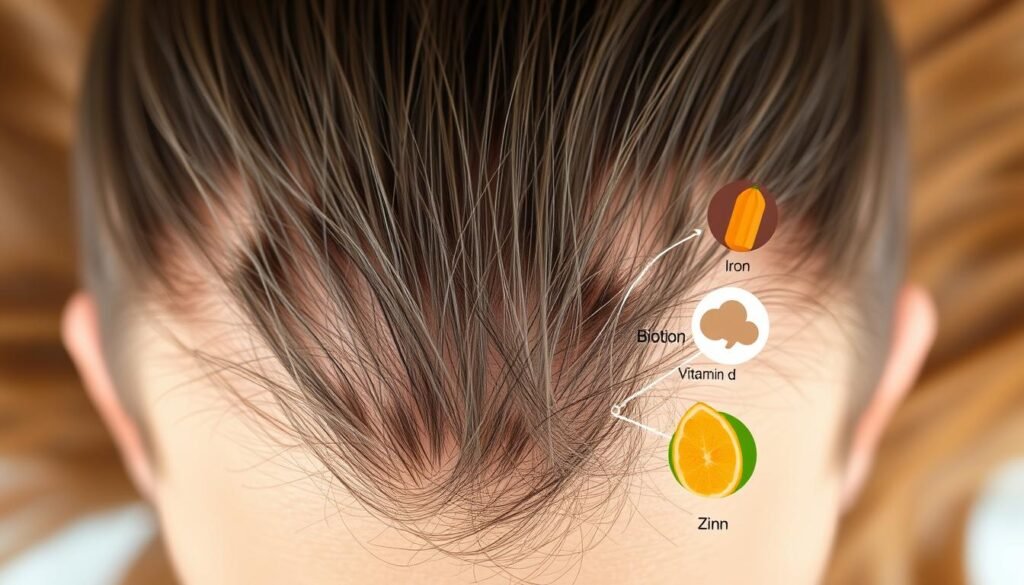Did you know that about 80 million Americans have issues with hair thinning or loss? This fact shows how widespread hair loss is in the U.S. It also points to the important role that vitamin deficiencies play in this problem. Whether caused by genetics, stress, or not getting enough key nutrients, it’s vital to understand how dietary solutions affect hair health. This article will answer common questions about how lacking vitamins impacts hair loss, using expert knowledge and solid research.
The link between vitamin D deficiency and hair health is confirmed by science. It’s crucial to focus on these often-ignored health and wellness topics. Want to keep your hair healthy and learn about vitamins’ role? Dive into the questions and answers in this article. For more information, check out the insights here. You can also learn about how some foods hurt your scalp here.
Key Takeaways
- Vitamin deficiencies are linked to hair loss in both men and women.
- Common deficiencies include Vitamin D, Vitamin B12, and Iron.
- Signs of vitamin deficiencies may encompass hair thinning, shedding, and dryness.
- Healthy dietary solutions can help restore vitamins and improve hair health.
- Consulting healthcare providers is essential for proper diagnosis and treatment.
Understanding Hair Loss and Its Causes
Hair loss affects many people, no matter their age or sex. People typically shed 50 to 100 hairs each day. This is normal and often not noticed. There are many causes of hair loss, including genetics, health issues, how we live, and stress. Knowing why hair loss happens is key to finding how to treat it.
Common kinds of hair loss are androgenetic alopecia, telogen effluvium, and alopecia areata. Male-pattern baldness shows up early and gets worse over time. Women may notice their hair thinning all over their head. Stress or hormone changes can cause temporary thinning. Alopecia areata causes sudden, patchy loss and can affect any body part.
Many things can make hair loss worse. These include hormonal shifts, certain medicines, and health problems like diabetes or anemia. Genes are a big factor in hair loss around the world. Aging, losing a lot of weight, and not getting enough nutrients can also lead to thinning hair.
Moreover, health conditions like thyroid issues and autoimmune diseases can cause hair loss. Scalp infections or scarring alopecia lead to permanent loss. Shock from emotional or physical events may trigger temporary shedding. It stops once the stress does. Tight hairstyles and harsh treatments can also damage hair and cause loss.
Understanding the various types of hair loss and their causes is vital. Choosing the right treatment, either medical or lifestyle changes, can help improve hair health.
Vitamin Deficiencies: A Potential Culprit for Hair Loss
Many studies show that not getting enough vitamins can cause hair loss. Your hair needs essential vitamins to stay healthy and grow properly. If you lack certain vitamins, you might notice your hair getting thinner, weaker, or falling out more. Lack of iron, zinc, and selenium are big reasons for hair problems.
Iron deficiency is a huge problem worldwide, affecting over 1.2 billion people. It’s a leading cause of hair loss. Iron helps move oxygen around in your body. Without it, you can get anemia, which makes hair issues worse. Zinc helps your hair grow and stay healthy. If you don’t eat well, you might not get enough zinc, especially if you are sick.
Vitamin E keeps your scalp healthy, which is important for healthy hair roots. But, not having enough vitamin C can stop your hair from growing strong. It’s because vitamin C is needed for making collagen. Also, not having enough essential fatty acids can lead to hair loss on your scalp and eyebrows.
Amino acids are also crucial. Not having enough can make vitamin deficiencies worse, leading to more hair loss. Experts say we need more research into how adding nutrients might help with hair loss. They’re trying to find the right balance between helping and not giving too much of vitamins like selenium, vitamin A, and vitamin E.
| Vitamin | Role in Hair Health | Effect of Deficiency |
|---|---|---|
| Iron | Oxygen transport to hair follicles | Thinning hair, anemia |
| Zinc | Hair tissue growth and repair | Hair loss, weakened strands |
| Selenium | Protects hair follicles | Damaged hair, loss of strength |
| Vitamin E | Protection for the scalp | Increased hair shedding |
| Vitamin C | Collagen production | Weak hair structure |
How Do Vitamins Affect Hair Health?
Vitamins are key in keeping hair healthy. They help with growth and upkeep by supporting important processes. Eating foods full of vitamins makes sure our hair gets what it needs to be strong and grow well.
Vitamin A helps cells grow. It’s good for hair and skin glands. It makes sebum which keeps your scalp moisturized and hair smooth. Women need 700 micrograms of vitamin A daily, while men need 900. Not having enough can cause problems, but too much might lead to hair loss.
Vitamin C fights off harmful free radicals that can damage hair. It’s needed to make collagen, a big part of hair. It improves blood flow, so hair follicles get the right nutrients for growth.
Biotin is known for making hair thick. It’s important for turning food into energy and making protein for hair. Dr. Khetarpal suggests 3 to 5 milligrams of biotin each day. Not having enough can cause hair to thin.
Vitamin D is crucial for making new hair follicles. Without it, we might face hair loss from conditions like alopecia areata. Vitamin E helps blood flow to the scalp and fights stress, keeping hair growing for longer.
Lack of iron is bad news for hair. It can lead to anemia and noticeable hair loss, especially in women. Zinc supports hair and scalp health. But, too much of these without a doctor’s advice can be harmful.
Having a diet with lots of different vitamins, especially A, C, D, E, and B, and minerals like iron and zinc, is great for hair. Knowing how these interact shows why it’s important to eat a balanced diet for hair health.
| Vitamin | Role in Hair Health | Recommended Daily Allowance (Micrograms) |
|---|---|---|
| Vitamin A | Cell growth, sebum production | 700 (Women), 900 (Men) |
| Vitamin C | Collagen synthesis, antioxidant | 75 (Women), 90 (Men) |
| Biotin | Amino acid synthesis, energy metabolism | 3-5 mg (Recommended) |
| Vitamin D | Regulates hair growth cycle | 15 |
| Vitamin E | Reduces oxidative stress, improves circulation | 15 |
| Iron | Prevents anemia, supports overall health | 18 (Women), 8 (Men) |
| Zinc | Promotes scalp and hair health | 8 (Women), 11 (Men) |
Common Vitamins Linked to Hair Loss
It’s key to know which vitamins impact hair loss to choose the right foods. The main vitamins to watch are vitamin D, vitamin B12, and vitamin A. They are essential for hair health. Not having enough can mess up hair growth.
Vitamin D helps hair grow by cycling hair follicles. Too little can cause more hair loss, especially in those already prone to it. This vitamin keeps hair follicles healthy and encourages them to grow right.
Vitamin B12 helps make red blood cells that oxygenate hair follicles. Without enough, you might see more hair falling out. It’s crucial to have enough for your hair to be healthy.
Vitamin A boosts sebum production. This oil nourishes hair and keeps it moist. But, too much vitamin A – over 800 micrograms daily – can cause issues like blurred vision and hair loss.
Other important vitamins for hair include:
- Vitamin E: This vitamin shields hair follicles. Women need 3 milligrams and men 4 milligrams daily.
- Biotin, niacin, and folic acid: These nutrients are vital for healthy hair growth.
- Zinc: You need 10 milligrams daily. It’s important for hair structure but too much or too little can cause loss.
Knowing about these vitamins can guide your diet to fight hair loss. Checking your vitamin levels, with a doctor’s help, is smart. This way, you can spot shortages early for better hair care.
| Vitamin | Recommended Daily Allowance (RDA) | Effects of Deficiency | Effects of Excess |
|---|---|---|---|
| Vitamin D | N/A | Increased hair loss | N/A |
| Vitamin B12 | N/A | Excessive shedding | N/A |
| Vitamin A | 800 micrograms | Dry hair, hair loss | Blurred vision, vomiting, hair loss |
| Vitamin E | 3 mg (women), 4 mg (men) | Hair follicle damage | Increased risk of death, bleeding complications |
| Zinc | 10 milligrams | Hair loss | Hair loss |

FAQs About Vitamin Deficiencies
Many people wonder how vitamins affect hair health. It’s important to know which vitamins are needed for strong hair. Certain vitamins are key for hair growth and keeping hair follicles healthy.
What Vitamins Are Essential for Healthy Hair?
Key vitamins for hair health include:
- Vitamin A: Promotes healthy sebum production to keep hair moisturized.
- Vitamin B12: Essential for maintaining red blood cells, which nourish hair follicles.
- Vitamin D: A deficiency can hinder new hair growth.
- Vitamin E: Acts as an antioxidant, reducing oxidative stress on the scalp.
For more info on these essential nutrients, readers can look at the FAQs regarding dietary supplements.
How Do Deficiencies in Vitamin D Affect Hair Growth?
Vitamin D deficiency is linked to hair loss. Lack of vitamin D may mess with the hair growth cycle. Hair cycles through growth, rest, and shedding phases, and low vitamin D could lengthen the rest time.
Can Vitamin B12 Deficiency Lead to Hair Loss?
Yes, vitamin B12 hair loss is a concern. Low vitamin B12 can cause anemia, meaning less oxygen for hair follicles. This can make hair weak and lead to loss. Better diet or supplements can help a lot.
Signs of Vitamin Deficiencies in Relation to Hair Loss
Spotting the signs of vitamin deficiencies is crucial for those noticing hair shedding and hair thinning. Key vitamins and minerals play a big role in keeping hair healthy. Knowing how these nutrients affect hair can help catch issues early. Hair growth goes through cycles, including one where shedding is normal. Understanding normal hair shedding is key to recognizing hair health.
How to Identify Hair Shedding and Thinning?
Normally, losing 50 to 100 hair strands a day is considered okay. But if you’re losing more, it might point to a problem like lacking vitamins. Signs that vitamins are affecting hair include:
- Noticeable clumps of hair falling out
- Seeing more scalp in some spots
- Weak hair strands that break off easily
When hair thinning gets noticeable, seeing a skin doctor is a good step. Dermatologist centers in South Florida stress catching these symptoms of deficiencies early.
What Other Symptoms May Indicate a Vitamin Deficiency?
Besides hair loss, vitamin shortages can cause many symptoms. People might feel:
- Tired and weak
- Mood swings like sadness or quick to anger
- Dry skin or fragile hair
- Slow healing sores
- Body aches
Pairing these symptoms with hair issues could point to a bigger health problem. To learn more about how lacking vitamins leads to hair loss, check this resource.

How to Diagnose Vitamin Deficiencies
To find out what’s causing hair loss, it’s key to look closely at one’s health. Seeing a healthcare provider first is important, especially with unexplained hair issues. They often suggest blood tests to check vitamin levels.
These tests can show if specific missing vitamins might be leading to hair loss or other problems. In the U.S., over 30% of people might lack enough vitamins. It’s important to know the signs and get help quickly.
For those like pregnant women and young kids, getting checked regularly is crucial. Not having enough vitamins or micronutrients can cause many issues, including weak growth and anemia. Blood tests give helpful details about vitamin amounts in the body. This ensures they are in a healthy range.
With shocking numbers from the CDC, like 95% of people not having enough vitamin D, getting tested often is key. Different vitamins show different symptoms when low. Proper diagnosis can help fix these issues, even improving hair loss.
How often to check vitamin levels isn’t the same for everyone. Talk to your healthcare provider about the best plan for you. Catching issues early can really help your health and hair. If you’re worried about losing hair, taking steps quickly matters. For more info on hair loss causes, check out this resource.
Treatment Options for Vitamin Deficiencies and Hair Loss
Fighting against hair loss means dealing with vitamin shortages first. There are ways to boost your vitamin levels. These include natural foods and taking supplements. A healthy diet is key. It helps your hair grow and keeps you feeling strong.
Natural Dietary Solutions to Restore Vitamin Levels
Eating certain foods can up your vitamin game. This helps fight off hair problems with nature’s help. Let’s look at some good food sources:
- Vitamin D: Found in fatty fish, fortified dairy products, and egg yolks; the NIH recommends 600 IU daily.
- Vitamin B12: Present in meat, dairy, and fortified cereals; vital for hair health.
- Biotin: While rare in deficiency, it can be sourced from nuts, eggs, and legumes.
- Folate: Abundant in dark green leafy vegetables, fruits, nuts, and legumes; recommended intake is 400 mcg.
- Vitamin A: Found in liver, carrots, and sweet potatoes; plays a role in regulating hair growth.
- Vitamin C: Sources include citrus fruits, strawberries, and bell peppers; important for collagen production.
- Vitamin E: Available in nuts, seeds, and green leafy vegetables; contributes to scalp health.
Over-the-Counter Supplements and Their Benefits
If your diet isn’t enough, consider supplements. Experts often suggest them for those not getting enough vitamins. They can really help if you have a deficiency.
| Supplement | Vitamin(s) Included | Potential Benefits |
|---|---|---|
| Vitamin D | Vitamin D | May improve hair growth in individuals with low levels. |
| Vitamin B12 Complex | Vitamin B12 | Supports hair health and helps prevent hair loss. |
| Biotin | Biotin | Can enhance hair strength and thickness. |
| Folic Acid | Folate | Supports optimal hair growth and cellular health. |
| Multivitamins | A, C, D, E, B-Complex | Provide a broad spectrum of vitamins essential for hair and overall health recovery. |

Consulting Healthcare Providers for Hair Loss Issues
Seeking help from healthcare providers is key for those with hair loss. Over 80 million Americans struggle with this condition. It shows why expert guidance is vital. In a consultation, patients learn about reasons for their hair loss and get treatments just for them.
Doctors can find out what causes hair loss in a patient. It might be genes, hormone changes, or not having enough nutrients. For example, Minoxidil (Rogaine) and Finasteride (Propecia) are two treatments that work well. Both are approved by the FDA.
Doctors might also suggest changes in diet or supplements to get back important nutrients. Sometimes, they propose advanced treatments. One is Platelet Rich Plasma (PRP) treatment, which helps grow new hair and stops hair from getting thinner.
It’s crucial to know how hair grows. The growth of hair has three phases. Problems in these phases can cause a lot of hair to fall out. Understanding this helps patients and doctors find the best treatments.
The COVID-19 pandemic has increased hair loss for many. This shows the importance of getting help from specialists. With the right medical and lifestyle changes, people can find good solutions for their hair loss.
Conclusion
This article made it clear: vitamins and hair loss are closely linked. Knowing how vitamins affect hair health makes us think about our diet and health. Addressing vitamin shortages is a key step in fighting hair loss.
It’s important to keep an eye on our vitamin levels. Even small shortages can lead to hair problems. This article helps us understand how proper nutrients promote hair growth. The FAQs offer quick answers to common questions.
Remember, improving hair health is doable with the right lifestyle and diet changes. Talking to doctors can help customize a plan for vibrant hair. Adopting these methods can change how we view hair loss, emphasizing nutrition’s role in keeping our hair healthy.